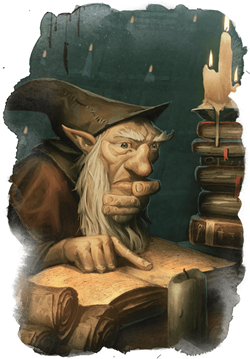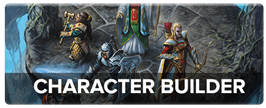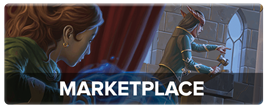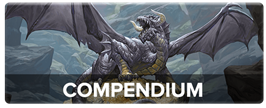 New Player’s Guide is going on hiatus, giving us some space to return to beloved series like Class 101, Spell Spotlight, How to Play Monsters, and to explore new ideas. In the meantime, however, we want to know what D&D questions are burning in your mind, so that we can answer them once we come back. Reply to the comments of this post with ONE question for D&D Beyond’s Lead Writer James Haeck.
New Player’s Guide is going on hiatus, giving us some space to return to beloved series like Class 101, Spell Spotlight, How to Play Monsters, and to explore new ideas. In the meantime, however, we want to know what D&D questions are burning in your mind, so that we can answer them once we come back. Reply to the comments of this post with ONE question for D&D Beyond’s Lead Writer James Haeck.
We’re looking for questions about Dungeon Master skills, player tips, dungeon design, encounter design, magic item design, monster design, and anything else that will help you be the best DM or player you can be!
When New Player’s Guide returns from hiatus, we’ll have combed through your questions with a particular eye for ones that will benefit the entire D&D Beyond community. We can’t wait to read your questions!
Create A Brand-New Adventurer Acquire New Powers and Adventures Browse All Your D&D Content
 James Haeck is the lead writer for D&D Beyond, the co-author of Waterdeep: Dragon Heist, Baldur's Gate: Descent into Avernus, and the Critical Role Explorer's Guide to Wildemount, a member of the Guild Adepts, and a freelance writer for Wizards of the Coast, the D&D Adventurers League, and other RPG companies. He lives in Seattle, Washington with his fiancée Hannah and their animal companions Mei and Marzipan. You can find him wasting time on Twitter at @jamesjhaeck.
James Haeck is the lead writer for D&D Beyond, the co-author of Waterdeep: Dragon Heist, Baldur's Gate: Descent into Avernus, and the Critical Role Explorer's Guide to Wildemount, a member of the Guild Adepts, and a freelance writer for Wizards of the Coast, the D&D Adventurers League, and other RPG companies. He lives in Seattle, Washington with his fiancée Hannah and their animal companions Mei and Marzipan. You can find him wasting time on Twitter at @jamesjhaeck.











-
View User Profile
-
Send Message
Posted Aug 2, 2020Shillelagh, duelist, and magical items all stack. You'll get the +1 from the magic weapon, but it won't become "doubly magical" both because that isn't a thing in this game and because Shillelagh specifically mentions it only makes non-magical weapons magical. In the end you'll use your casting modifier (from a Druid, that's Wisdom) instead of Strength for + to hit and + damage, the weapon die will become a d8, you'll get +2 damage from duelist, and an additional +1 to hit and +1 to damage from the +1 magical item.
-
View User Profile
-
Send Message
Posted Aug 2, 2020Design encounters where characters can use their abilities. They take them because the like the sound of them/they look good. Not every ability needs to be useful in every encounter, but take in mind the abilities that the characters have, especially new ones :).
-
View User Profile
-
Send Message
Posted Aug 2, 2020For lightning rails in particular you need infrastructure, historical need, and capability to create and manufacture. All of which would require a stable government of some sort that rewards creative thinking. So in some land with a stable government and high creativity (say, a gnomish enclave within an ancient elven kingdom) and a lot of land to cover to send goods along. Possibly major cities on opposing coasts under the same government. They'd need the goods, magical resources and mundane, to manufacture both the rails and the trains. This likely makes them a prime target for kingdoms with less natural and personnel resources, so the trains themselves might have a military use as well so that the kingdom can remain safe.
-
View User Profile
-
Send Message
Posted Aug 2, 2020Seconding dark mode, would be fantastic.
Regarding the Nothic in the Redbrand Hideout, I think it actually does make sense, and I'll put the rest in spoilers just in case.
Tresendar manor is a place that was likely once of local historical significance before the first destruction of Phandalin. That's the kind of esoteric knowledge a wizard totally may have known prior to messing with the dark forces that caused the Nothic transformation. He was probably there long before the town was beginning to be rebuilt, but after its initial destruction. The crypt itself (and the skeletons guarding it) are ancient, like thousands of years ago ancient, and there's obviously some mild magical enchantments on the grounds. In my game there's going to be a bit more history regarding the manor that's tied into a couple of my character's backstories, it's just not built into the module.
-
View User Profile
-
Send Message
Posted Aug 2, 2020A lot of my newer players seem to struggle with the roleplaying aspect of the game. It would be nice to have some sort of primer on what to expect, and different styles of roleplaying.
-
View User Profile
-
Send Message
Posted Aug 2, 2020I'm a bit confused about the bard's spellcasting focus.
A bard can use a musical instrument as a spellcasting focus, but does this mean the bard has to play the instrument or just hold/touch the instrument with one hand? Most musical instruments are two handed. Does this mean that a valor bard in the front lines has to sheath her weapon, doff her shield and then hold her instrument in a playing position to cast a spell using the instrument to replace a material component. That seems far too much to do as a single action. Or does a bard with a lute on her back just reach back and touch the lute while casting a spell.
Other casting classes that might also be involved in melee combat have it easier. A cleric or paladin can have a holy symbol in her shield. Druidic focuses tend to be small branches or sprigs that can be easily used with one hand. But most instruments that a bard might use are big and need both hands.
Or should a bard just use a component pouch, or stick to spells that don't require material components in melee battle (bye bye shatter)?
-
View User Profile
-
Send Message
Posted Aug 3, 2020The Encounter Beta is really badly designed when will it be improved? There are not enough opportunities to save when you change things so it reverts to presets. Also how can you add characters to an already existing campaign? You need to add more flexibility to these tools to make them usable.
-
View User Profile
-
Send Message
Posted Aug 3, 2020I want to play but don't know people in my town or country who palys d&d.
-
View User Profile
-
Send Message
Posted Aug 3, 2020Hey, Nilouise! Check out the forums here on D&D Beyond. There's one where people look for games to join or players for their campaigns. Lots of D&D campaigns are played online over platforms like Discord, with either text, voice, or video, or a combination of these. Of course, you'll need to keep time zones in mind so that you make sure whichever campaign you join has sessions scheduled at a good day and time for you. I hope that helps!
-
View User Profile
-
Send Message
Posted Aug 3, 2020Can a bard not carry an instrument on a strap and then touch/position with one hand as necessary?
-
View User Profile
-
Send Message
Posted Aug 3, 2020what is the difference between a demon and a devil?
-
View User Profile
-
Send Message
Posted Aug 3, 2020The teacher idea is a good one. One thing I've noticed is that random encounter tables are usually only full of monsters/badguys. Yet if your characters are traveling down a highway (e.g.the high road along the sword coast) they could see a 'mounted patrol' of say 4 to 12 mounted troopers who are patrolling the highway. Or in a 'dungeon' perhaps three adventurers (the remnants of a bigger party.) who can join/help the party with map and or info on what killed the rest of their party.
-
View User Profile
-
Send Message
Posted Aug 3, 2020Hi Playing A Warlock and Have a few questions regarding Darkness/Devil's Sight Combo.
1) if an opponent is moving out of darkness radius spell range, are there any penalties for moving while being effectively blinded? or do they just move out and attack as normal on their turn?
2) If My character is shrouded in darkness, are other characters at disadvantage to hit him only, or are there also miss percentage chances as Well? (the DM often has characters/monsters target me at range while my character is in Darkness. The monsters just are at disadvantage- which often still hit.) Mechanically this doesn't make sense to me as how can they target me if they don't know what square I'm in?
-
View User Profile
-
Send Message
Posted Aug 3, 2020Can a wizard use a 'quarter staff' as casting focus (Staff)?
-
View User Profile
-
Send Message
Posted Aug 3, 2020Being an inexperienced GM/DM, I have difficulty getting the group back on track if they focus on the... wrong thing in an adventure. For example, characters were hired to protect a caravan with the promise of payment on the other end. They arrived and the caravan "owner" didn't pay them the agreed-upon sum. They didn't put the clues together that the caravan "owner" 1) got there ahead of them when there was only one road between the towns, and 2) when their detect evil spell "failed" they decided to focus on the caravan owner instead of investigating the cargo. (The real owner was still in the original town. A doppelganger just started operating as the owner in the other town without owner's knowledge.) We spent an entire session of them trying to track the "owner" instead of following the cargo, which continued with the caravan. That's the example. The question is how does one allow the freedom to explore yet keep the story moving forward? My friends gave up as me being the GM/DM because the session wasn't fun for them (it was only my 2nd or 3rd session). I wasn't prepared for them to follow this rabbit trail.
-
View User Profile
-
Send Message
Posted Aug 3, 2020What are good ways to handle dialogue in combat, namely PC's talking to enemies? My players often want to negotiate when I want the monsters to be bloodthirsty. But just as often, the PC's want slaughter when they're supposed to be talking to the NPC's.
-
View User Profile
-
Send Message
Posted Aug 3, 2020It's not super clear in the rules. Going by RAW, you might have to treat an arcane focus staff as an improvised weapon (1d4). Sounds like something you'd want to go over with your DM; I feel like it's perfectly reasonable to treat a staff as a quarterstaff and it really completes the flavor.
-
View User Profile
-
Send Message
Posted Aug 3, 2020One of my characters has been infected with lycanthropy. Reading the monster manual tells me basic info on it but not what to apply to my character other that looks basically. Nothing saying what abilities are affected. So my question is, what if anything needs to be changed/added to my sheet?
-
View User Profile
-
Send Message
Posted Aug 3, 2020Wondering if I could run a character with lycanthropy from the start
-
View User Profile
-
Send Message
Posted Aug 4, 2020I would use the sourcebook for ideas and reskin it for your setting